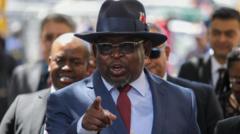South Africa has plunged into a crisis as its coalition government navigates profound discord over the national budget, which was unveiled after a month-long delay. Analysts suggest that the country is experiencing unprecedented challenges, especially following Finance Minister Enoch Godongwana's budget plan meeting fierce resistance from essential coalition allies.
The African National Congress (ANC), now governing alongside nine other parties after losing its parliamentary majority, jeopardizes budget approval due to the absence of support from its strongest coalition partner, the Democratic Alliance (DA). This coalition, formed in the wake of last year's elections, may not succeed unless it can reconcile its contentious policies or gain backing from major opposition parties.
The budget presentation faced delays as Godongwana initially proposed an increase in value-added-tax (VAT) to combat a pressing cost-of-living crisis. The government has been accused of being out of touch with citizens' needs as they grapple with escalating living costs. The minister's attempts to mitigate survival concerns by revising VAT upward to a milder 16% have been further scrutinized, leading to a strong backlash.
The Finance Minister argues that tax increases are vital for addressing ongoing pressures in vital sectors such as health, education, and security. However, critics emphasize that these adjustments could exacerbate the economic strain on the population, especially on the most vulnerable communities.
Despite ANC backing, the DA's staunch opposition remains a formidable hurdle. The DA’s stance is clear: it will only support temporary tax increases, contingent on significant economic reforms that would foster job growth and efficient governance. This political deadlock has tainted President Cyril Ramaphosa's image as a skilled negotiator, reducing alliances to mere fragments, with only minor parties like the Patriotic Alliance showing support.
The ongoing budget tussle emphasizes the fragile state of the coalition, reflecting broader disputes over crucial policies, including controversial land reforms. Legal challenges and fierce opposition from significant factions regarding property rights have left the ANC scrambling for necessary votes to ensure budget passage.
Thokozile Madonko, an analyst from Wits University, notes the critical role of parliament in this turmoil and underscores the need for the ANC to engage with other parties effectively. Failure to navigate these negotiations could lead to a significant government collapse.
Expert opinions criticize Godongwana's reliance on VAT increases as a rudimentary solution to wide-ranging fiscal problems, arguing for wealth redistribution through targeted taxes affecting the affluent. Adrian Saville echoes these sentiments, pressing for quantitative commitments that would show real fiscal accountability rather than vague promises.
As South Africa stands at a crossroads, the ability of its coalition government to pass a workable budget will not only affect economic stability but also challenge the credibility of its leaders, particularly Godongwana's reputation as a competent steward. The pressure is building as the nation watches closely for signs of resolution or continued turmoil.




















